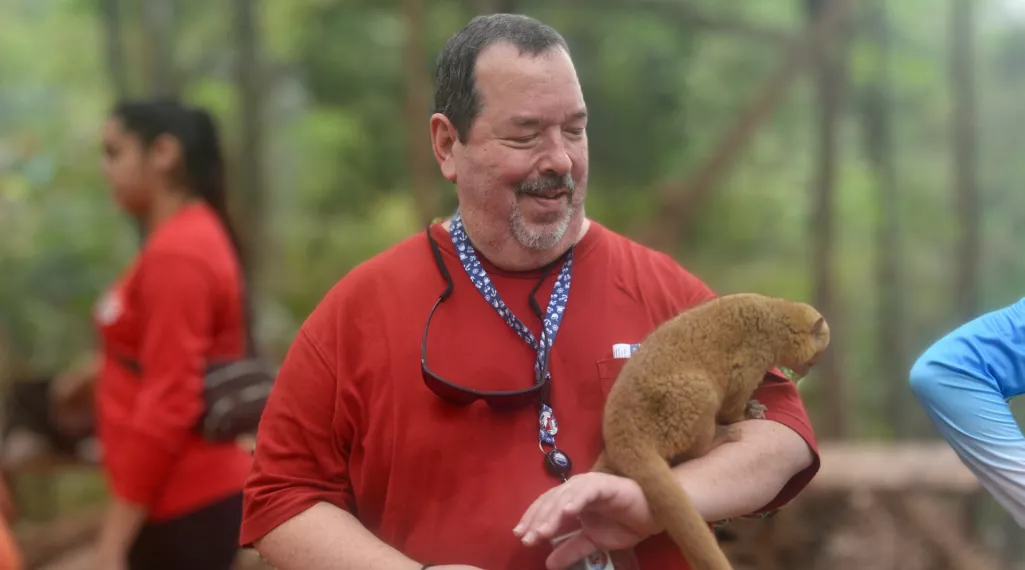
Don Shippey: from stage IV to six years cancer-free after receiving HAI pump

Don Shippey was 55 years old in 2016 when he decided he’d been putting off his colonoscopy long enough. At the time, the recommended screening age was 50. Having had no symptoms or other known risk factors, Don figured he was unlikely to have any problems.
When Don woke up from his colonoscopy procedure, he couldn’t believe he was receiving a stage II colon cancer diagnosis that would later progress to a stage IV diagnosis with metastasis to his liver. When he was given a 40% chance of living past one year, Don was determined to search for alternative answers.
Seven years later, Don now celebrates six years with no evidence of disease (NED). Thanks to his persistence and after receiving Hepatic Artery Infusion (HAI) therapy, Don has been able to have a second chance at life1.
From Medically Hesitant to Medically Involved
Don, like so many others, isn’t the biggest fan of going to the doctor. He describes how this played a role in his postponed colonoscopy screening.
“Honestly, I was a bit scared of the test,” Don said. “I’d always been weary of doctors and dentists, and remembered reading so many stories online about how horrible the colonoscopy process was. Looking back on it, I feel stupid for not getting it when I was 50. I could have had a less developed cancer with one simple surgery and been done with it.”
While Don wouldn’t recommend colonoscopy prep as a hobby, he also acknowledges that it was a lot less severe than he was initially anticipating.
“The actual colonoscopy was nothing,” Don said. “They give you a sedative. You fall asleep. You wake up in recovery. There’s no residual pain or anything. The prep the day before is a bit unpleasant, but it’s still better than getting cancer that will linger over you your entire life.”
After Don’s initial diagnosis (stage II colon cancer) and surgery to remove his cancer, he completed a whirlwind of scans and tests, after which he was nearly declared NED. There were a few minor spots that showed up on his liver, but nothing his medical providers were concerned about. Don was told he wouldn’t need chemo or further treatment.
“I was surprised when my doctors weren’t even recommending I see an oncologist,” Don said. “They didn’t think I needed to be seen for another six months. I pushed back and asked for a three-month follow-up and was told I could get one in four months instead.”
It’s a good thing that Don followed his instincts because four months later he would be re-diagnosed with stage IV colon cancer with metastases to the liver and given a 40% chance to survive more than a year.
“I remember feeling angry that all three doctors had dismissed my case as being fine, despite some small spots that were showing up on my liver scans,” Don said. “After that, I decided to become much more involved in the process, and I threw myself into research. I wasn’t willing to accept the mere 40% survival rate they were giving me.”
Research Brings New Hope
Don began compiling spreadsheets of research with various peer-reviewed studies and came across HAI therapy.
“I read about HAI pump trials and the stats and chances at survival,” Don said. “I decided to contact these places directly, and I got in pretty quickly at Memorial Sloan Kettering Cancer Center.”
After several more rounds of tests and scans, Don was recommended for HAI therapy by his new medical team at Sloan Kettering.
“My other doctors never mentioned this therapy to me,” Don said. “Initially, I was provided a standard care plan with six rounds of chemo and low life expectancy. Had I listened to them, it’s likely I wouldn’t be alive today.”
The next six months of Don’s life were dedicated to his new treatment regime with the HAI pump.
“I went back and forth from Florida to New York for my HAI treatments,” Don said.
While travel to New York was necessary in the past, today, a growing number of hospitals that offer HAI therapy means that fewer patients need to travel for HAI therapy. More patients can get the HAI pump and have it refilled closer to home.
“I also did systemic chemo during this time. In July of 2017, I was finally finished, and I’ve been NED ever since.”
What Is HAI Therapy?
Intera Oncology’s Hepatic Artery Infusion (HAI) pump is the only FDA-approved HAI therapy device for people living with colorectal cancer that has spread to their liver. The pump – which is palm-sized – is implanted in the abdomen, with a catheter attaching to the hepatic artery, the blood vessel that connects to the liver. The therapy is then pumped through the catheter to the hepatic artery, allowing for a more directed treatment to shrink or remove liver tumors.
The use of the pump allows for HAI therapy that is up to 400 times the concentration of traditional systemic chemotherapy to be delivered to the tumors in the liver, while minimizing systemic side effects to other unaffected parts of the body. HAI therapy can be an option for patients with liver tumors that can’t be surgically removed. It can also be used for patients who have had their liver tumors removed, to help prevent tumors from growing back.
The HAI pump device has been around for more than 25 years and has been included in numerous peer-reviewed publications. A growing number of cancer centers are now offering this therapy, and Intera Oncology offers help to patients and caregivers who fill out a form, providing information about HAI therapy and help with finding an HAI specialist.
Don opens up about his experience with HAI pump therapy.
“Initially, I wanted to know how big the pump was, how it would affect my normal day-to-day life, and how it would impact my liver from the chemo concentration levels,” Don said. “I’d meet people in the waiting room at Sloan and everyone I talked to never had any life-threatening effects from the HAI. While any therapy could have a chance of serious side effects1, I’d take those risks any day over a shot at a longer life.”
Many HAI patients are able to live with the device with little to no changes to their normal routines.
“I still have it in,” Don said, “I plan to remove it in the future, but it just made sense to keep it in for now. I’ve been pleased with how little it’s affected my energy levels and overall feeling of wellness. While I can’t go skydiving or scuba diving, my life is pretty much the same as it always was.”
Lessons Lived & Learned
Now that Don has come full circle on his cancer-healing journey, he’s had time to reflect on some lessons he’s learned along the way.
“The first thing I’d want others to think about is to go ahead and get screened,” Don said. “Whether you have symptoms or not, not getting a colonoscopy and then later finding out you have cancer is far worse than any discomfort you might feel for one day out of your life.”
Don has used his experiences to help others facing similar diagnoses. He started his own Facebook group, Liver Mets from CRC, where he shares a lot of the knowledge and wisdom he’s gained over the years.
“The other thing I always tell people is to not necessarily trust that the place you start is the place with the best care available to you,” Don said. “Try to get both a surgeon's and an oncologist’s opinion. My story is living proof that the first opinion you receive is not the end-all-be-all. If you have liver mets, make sure to inquire about whether or not the cancer center you’re looking into offers HAI pump therapy.”
Because Don never gave up on himself, he’s able to inspire others to keep pushing forward, as well.
“When you hear stage IV, don’t assume it’s a death sentence,” Don said. “Do the research based on your particular disease, get your genetic testing done, and push for alternative treatments. You gotta do whatever it takes because it’s your life you’re talking about. No matter how inconvenient or expensive it is, don’t give up on finding a way. Leave no stone uncovered.”
Outside of coaching others with CRC and liver metastasis, Don now takes every opportunity to live his life to the fullest, cruising around the world at every chance he gets. Don’s story is an excellent reminder that sometimes we can be our own best advocates. With a sense of persistence that is unwavering, Don is able to use his second chance at life to help others find the same.
Notes:
- Don’s experience is unique to him, and individual results may vary. Talk with your doctor to see if HAI Therapy may be right for you. See full safety information here.
- The Intera 3000 Hepatic Artery Infusion Pump is indicated for the continuous arterial administration of Cerona Therapeutics Floxuridine for Injection, USP, heparinized saline, and glycerin.
- The approved labeling for Cerona Therapeutics Floxuridine for Injection, USP stipulates the indications, contraindications, and warnings for use of the drug in the pump.
- The Intera 3000 Hepatic Artery Infusion Pump is contraindicated for use in patients with extensive extrahepatic disease or limited hepatic function.
- Possible adverse events of the pump are those potential risks associated with any implanted drug delivery device and include: catheter thrombosis, bolus path occlusion, vessel thrombosis, pump dislodgement, seroma, or recurrent hematoma, infection, extravasation, catheter shear, dislodgement or leakage, migration, arterial pseudoaneurysm, arterial dissection, and extrahepatic perfusion.
- Caution: Federal law (USA) restricts this device to sale by or on the order of a physician. Please review the full safety information at https://www.interaoncology.com/patients-caregivers/hai-therapy/safety-information.
Top resources

Christy Williams: Biomarker testing leads to successful treatment
Statistics suggested that Christy’s odds of survival were grim, so she leaned into her faith and kept a positive outlook. She tried to control what she could. And, critically, she received biomarker testing.

EPIC Act to Advance New CRC Therapies Needs Support
The EPIC Act would encourage investment in clinical trials for additional uses of existing drugs.

Volunteer spotlight: Nancy Pope
Get to know Colorectal Cancer Alliance volunteer Nancy Pope and consider being a service to the community yourself.





